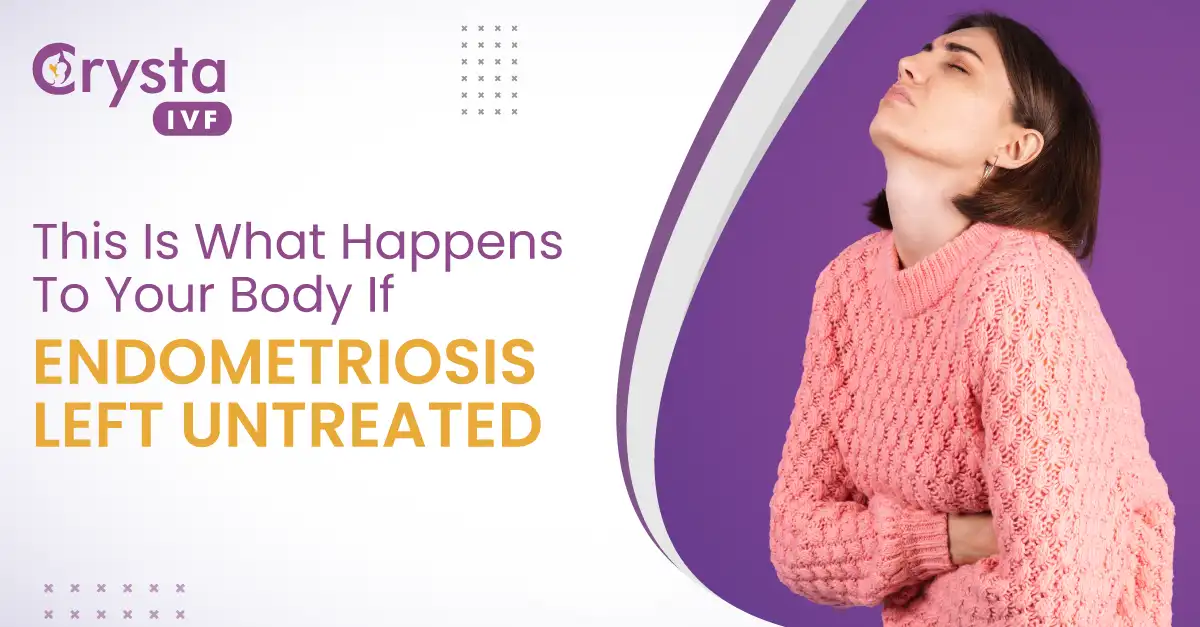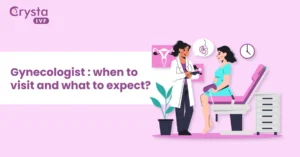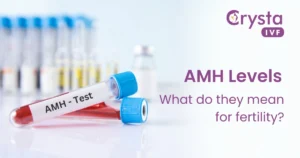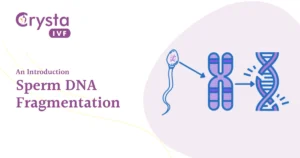Endometriosis is when endometrial tissues grow outside the uterus, causing pain and reproductive health issues. Yet, it is also true that around 60% of women with mild to moderate endometriosis conditions have conceived naturally without requiring any treatment.
Endometriosis symptoms can severely impact your quality of life and cause painful menstrual cramps and infertility, which can make you feel depressed or overwhelmed. Many women find that being proactive with treatment helps them feel better and live normally.
But what if endometriosis is left untreated? Will it have the potential to become fatal? And how may it lead to permanent infertility? Many women are unaware of the condition or often show carelessness despite having the symptoms.
So, here’s a closer look at how endometriosis can diminish your quality of life, what happens when the condition goes untreated, and the ways to manage it.
Read More: Yoga for Endometriosis
Understanding Endometriosis Basics
Endometriosis is a chronic health condition in women of reproductive age, causing the tissue to grow outside your womb (uterus) on other reproductive organs.
Endometrium, i.e., the uterus lining, forms every month for pregnancy. During a normal menstrual cycle, the lining sheds as your period when you don’t conceive, and the lining builds up again for pregnancy once your period ends.
However, in endometriosis, the endometrial tissues grow outside the uterus, causing chronic inflammation in surrounding areas. This abnormal growth commonly occurs in ovaries and throughout your abdominal and pelvic cavities and may even form benign (i.e., non-cancerous) nodules.
When the period arrives, the misplaced tissue has nowhere to go as in normal uterus lining and thus can cause scar tissue, irritations, cysts, and adhesions that impair reproductive organs such as the fallopian tubes, ovaries, uterosacral ligaments, and other areas.
Symptoms of Endometriosis
The symptoms can vary significantly from one individual to the next. Many women with endometriosis often experience no symptoms and are unaware of their condition, making it difficult to determine the exact proportion of women who develop endometriosis.
However, an estimate suggests that nearly 5-10% of women of reproductive age experience endometriosis.
These are the most common symptoms you may notice:
- Painful periods
- Heavy periods or bleeding between periods
- Pelvic or abdominal pain
- Pain during intercourse
- Discomfort with bowel movements
- Pain in the lower back
- Diarrhea & Constipation (Dyschezia)
- Blood in urine
- Excessive fatigue
- Difficulty getting pregnant
The symptoms of the condition vary from person to person and depend on where the endometrial tissue is growing and how significant that growth is. Some people experience mild symptoms while others have moderate to severe ones.
What Happens If You Don’t Treat Endometriosis?
Endometriosis significantly impacts the woman’s physical, mental, and general well-being.
Unfortunately, there is no cure for endometriosis, and it does not resolve independently. If you have these symptoms, they will remain unless you get the treatment. In most cases, the condition may progress over time and cause severe complications.
In rare cases, endometriosis can also cause certain medical conditions that have the potential to become fatal if left untreated.
Infertility
In cases where endometriosis symptoms progress, it may cause fertility issues and difficulty getting pregnant. As per estimates, around 30 to 50% of infertility cases in women are associated with the condition.
In endometriosis, the tissue formed may prevent the egg from traveling to the uterus. It may also cause scarred fallopian tubes, distorted pelvis anatomy, and impaired implantation, thus contributing to infertility.
Small bowel obstruction
If endometriosis is left untreated, it may lead to specific health problems and bowel obstruction, which can cause severe stomach pain, nausea, and bowel perforation (hole in the bowel). The blockage may result in reduced blood supply to the intestines to become fatal.
Ectopic Pregnancy
Pregnant women with endometriosis are more likely to experience an ectopic pregnancy. An ectopic pregnancy is when the fertilized egg, i.e., embryo, attaches itself outside the uterus, usually in the fallopian tube. This may result in a ruptured fallopian tube and internal bleeding.
Chronic Pain
The severity of these symptoms can cause pain, heavy bleeding, and life-threatening symptoms in the areas it affects and beyond.
Furthermore, those with the condition have a higher risk of developing ovarian cancer.
Is Endometriosis a Life-Threatening Disease?
While endometriosis does impact the quality of happy & healthy life, the symptoms aren’t likely fatal. Many women find it challenging to carry out the daily chores because of the pain and discomfort. Others who wish to become pregnant might experience difficulty in conceiving.
If left untreated, the symptoms may progress, causing potential complications. Therefore, it is better to talk with the doctor to explore ways to minimize the risks and restore your ability to have a healthy lifestyle.
How To Manage Endometriosis?
While there is no permanent cure, the symptoms can be managed. Treatment options for endometriosis depend on the symptoms and the severity of the condition. Most women need a surgical diagnosis to evaluate their pelvic region, and others may need medications to lower or block estrogen to help control the pain.
A surgical procedure is carried out to remove the cyst, endometriotic lesions, adhesions, and blockages responsible for pain & discomfort. Usually, there are two types of surgeries:
1. Laparoscopy – The surgery can be recommended for diagnosis and treatment. A small device with a camera is inserted through the uterus to examine the pelvic regions and remove scar tissues and ovarian cysts.
2. Hysterectomy – The surgery is carried out only when the complications and symptoms are severe. It involves the removal of the uterus, ovaries, or cervix. Once these essential reproductive organs are removed, you won’t be able to get pregnant again.
Also, if you’re struggling with the condition and wish to get pregnant, know that women often don’t require medical treatment to conceive. However, undergoing laparoscopy surgery may help improve your chances of conceiving. Otherwise, you may want to explore other assisted reproduction treatments like In Vitro Fertilization (IVF).
Words From Crysta IVF
We know how painful a chronic disease like endometriosis can be, which is why we have helped many women effectively manage the condition through our fertility services. Although endometriosis is a painful condition, it’s not considered a fatal disease.
In extremely rare scenarios, however, the complications of endometriosis can be potentially life-threatening.
Therefore, we recommend you get proper consultation from a licensed medical professional at the best IVF center in Delhi/NCR at Crysta IVF. This way, you can make an informed decision in a timely manner.




